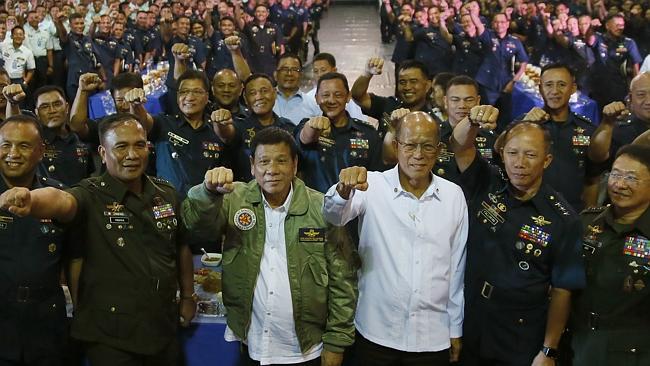Philippine President Duterte risks own goal by beating up on US
The Philippines president risks frittering away his country’s best bargaining chip in negotiations with China.

Philippine President Rodrigo Duterte risks frittering away his country’s best bargaining chip in negotiations with China by distancing his nation from its US ally, analysts have warned, after he signalled a desire to end his country’s longstanding military reliance on Washington.
In less than 48 hours this week, Mr Duterte demanded US special forces leave southern Mindanao, ordered an end to joint US-Philippine patrols of the South China Sea, and that his defence secretary look to China and Russia for cheaper military hardware.
The latest incendiary comments are consistent with the new President’s intention to carve out a new foreign policy, independent of the country’s former US colonial masters for whom he has professed little love.
The timing is critical. Mr Duterte is expected to visit Beijing next month where he will likely seek concessions in return for a negotiated settlement on the two countries’ territorial dispute in the South China Sea. Some have interpreted this week’s comments as a way of asserting Philippine independence ahead of that visit.
But in distancing Manila from Washington in order to build good relations with China, Mr Duterte may be risking an expensive own goal, given that The Philippines’ greatest negotiating strength with Beijing is its relationship with the US.
“This is not a good time to pick a fight (with the US),” said Richard Javad Heydarian, a political scientist at Manila’s de la Salle University. “The last thing we want the Chinese to think is that we have no back-up options.
“If China feels that Manila has no significant backing from the US, then it will be less inclined to take The Philippines seriously and give concessions.”
Malcolm Davis, senior Asia security analyst with the Australian Strategic Policy Institute, said Mr Duterte was “talking himself into a corner” by attempting to leverage Chinese support by ramping up US tensions.
“The risk is the Chinese will call his bluff and say: ‘You have just told us you want to buy military equipment from China and Russia and want US special forces out. So do that and we will talk’,” Dr Davis said.
“The question is, has he really thought about this or is he just speaking off the cuff as he did a week ago when he abused the President of the United States?’’
So far there is little indication The Philippines’ military would welcome a major pivot in alliances.
A shift to Russian and Chinese military technology would cause major “synchronising” problems for the military, which has historically looked to the US for defence supplies.
Inevitably, it would also reduce the capacity to “plug and play” into US systems, thus further locking the US out of the region.
Twice this week the Philippine military and defence establishment rushed to mop up after Mr Duterte. On Tuesday, in response to Mr Duterte’s comments on weapons procurement, a defence spokesman said: “We are awaiting guidelines on how the President’s policy statements will be implemented”.
A day earlier the military rushed out a statement assuring that the “Philippine-US defence relations remains rock solid” and joint combat training between US and Filipino forces “remain on track”, after Mr Duterte said US special forces must leave the restive south where they currently advise the military on counter-terrorism.
Mr Duterte’s determination to talk, rather than clash, with China over the South China Sea, notwithstanding the Permanent Court of Arbitration ruling in July that China had no legal claim to the atolls, reefs and islands within The Philippines’ Exclusive Economic Zone it currently occupies, hardly makes it a regional outlier.
He was a popular figure at the ASEAN summit last week, despite his “son of a whore” comment directed at US President Barack Obama, just as he is at home, where he enjoys a 91 per cent approval rating even as he presides over a war on drugs that has so far claimed 3000 lives.
But Mr Duterte is risking not only the country’s most vital strategic relationship but his own political capital by betting on his ability to extract major investment concessions from China.
A Pew survey last year on America’s global image showed The Philippines was the most pro-US nation on earth, with a 92 per cent approval rating for its most important ally. A June survey by local polling service Social Weather Stations found the US had a net trust rating of 72 per cent among Filipinos. China had a net trust rating of -24 per cent.
Dr Davis says that Filipinos are unlikely to tolerate Mr Duterte handing territory to the Chinese. “But the risk is that, by going down the path he is going, the Chinese will push harder and harder and this is the sort of thing we (in Australia) are facing with soft power,” he said.
“I do think there will be people within his government desperately trying to do damage control but how successful they will be, given the government he is running, remains to be seen.
“It’s safe to say The Philippines is spiralling downwards into chaos and complete disorder” — and that is fertile ground for an aggressive neighbour seeking influence.



